April is an important month of the year as, not only is it the end and beginning of the UK tax year but it is also the beginning of the French tax season.
Financial update France – April 2024
By Katriona Murray-Platon
This article is published on: 4th April 2024
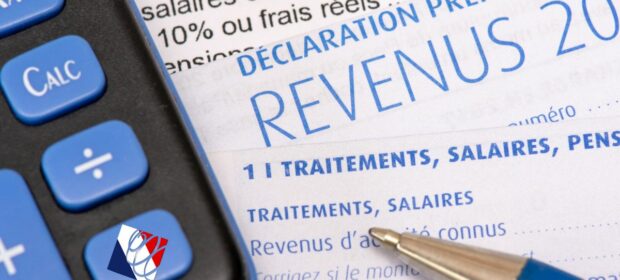
If you are impatient to start declaring your income for 2023 then the tax forms should be available in the next week or so (at the time of writing no official date has been given) but whether you decide to get started in April or wait until May it is important to know the deadlines for submitting the forms.
If this is your first year submitting your tax return you will need to do a paper declaration by the 20th May 2024 (date to be confirmed). Which means that you need to collect the paper forms from the tax office and fill out the information by hand.
The other dates for the online tax declaration service are:
| Department | Filing deadline |
| 01 to 19 | Thursday 23 May 2024 at 23h59 |
| 20 to 54 (including 2A and 2B) | Thursday 30 May 2024 at 23h59 |
| 55 to 974/976 | Thursday 6 June 2024 at 23h59 |
| Non-residents | Thursday 23 May 2024 at 23h59 |
I shall be tackling our tax return in the April school holidays so in my next Ezine I shall be addressing any issues that I have noticed and be giving you all my tips for filing your 2023 income tax declaration.
Do you remember the fun you had last year doing the occupied properties declaration? Well, the good news is that you don’t have to do it every year! You only need to do another one if there are any changes to the occupancy of your properties. Whilst the declaration does have to be done online,18% of property owners did not do a declaration last year and the tax authorities shall be issuing a new paper declaration for those who are unable to do their declaration online.
Did you know that students do not pay taxe d’habitation on their student accommodation (CROUS)? However, a ministerial response in January (no 7826 of 09.01.2024) has clarified that this exemption also applies to students who are still included on their parents’ tax returns but who live away from their parents in private student accommodation or who flat share.
As from 1st April many benefits, including family allowance, disability allowance and RSA, will increase by 4.6%, as a measure to mitigate the effects of inflation.
Those of you who do furnished rental were quite alarmed by the French government’s “faux pas” in the 2024 finance bill which lowered the micro threshold to €15,000 and the abatement to 30% thus forcing those who were over this limit to go into the costs (regime reel) based system. As expected, this has now been rectified and landlords can use the former thresholds (€77,700 micro-BIC with a 50% abatement for costs – https://bofip.impots.gouv.fr/bofip/3610-PGP.html/identifiant%3DBOI-BIC-CHAMP-40-20-20240214). Hopefully all the organisation will have got the memo but if you do have any problems please do refer to the link above. As always, if I hear anything further on this I will let you know.

There are three pillars to the French pension scheme, the basic social security pension, the complementaire points based system and the private PERs. I strongly advise anyone who has worked in France to create their profiles on the www.info-retraite.fr website and to regularly consult this website especially when you are getting closer to retirement age. I noticed on my own account that whilst I had accumulated points as a salaried worker, since starting my business in 2017 I had not received any further points nor had I been asked to contribute to receive them. This has now all been cleared up by a decision of the Council of State on 9th February 2024 (no 471203) which nullified a decree that provided that auto-entrepreneurs under the micro-BNC regime and micro-social regime that pay a set rate of social contributions of 21.1% do not acquire points under the complementaire retirement scheme. A new law should be published soon rectifying this as from 1st June. This will however imply that the rate of social charges will increase.
If you have any questions on your finances or taxes in France please do get in touch and I would be happy to arrange a phone call or meeting to discuss your concerns.
Investing: what can you expect?
By Portugal team
This article is published on: 31st March 2024

Due to the increase in interest rates over the last couple of years, cash has been a relatively attractive investment however as rates on deposits become less attractive, more investors are turning to investment portfolios to make their money work harder. But what type of return can I expect from an investment portfolio?
The return you achieve from your portfolio is determined primarily by the make-up of the underlying portfolio i.e. the split between shares, bonds and other assets such as property and commodities etc. This in turn is determined by your tolerance for risk and volatility.
Are investments really ‘risky’
Risk is misunderstood and is often confused with volatility. Risk can be more accurately defined as the chance of permanent loss of capital whereas volatility is simply the degree to which investments move up and down.
Although many feel shares in companies are a “risky” investment, if we look back over the past several decades, we can see the chance of permeant loss is very small when investing in blue-chip companies. These types of companies are in are in the business of trying to make a success of themselves, not run themselves into the ground!
Volatility is what scares most investors, the ups and the downs. But putting this into perspective, most of us own a home and are aware of what the property market does, it goes up and down. But unlike with an investment, you don’t have a ticker on your post box telling you the daily price, so you don’t see the volatility and therefore, do not “feel” the risk.
The reality
Figures from Credit Suisse show that over a 123-year period starting in 1900, shares in developed equity markets have generated returns at 5.1% above inflation and emerging equity markets have achieved 3.8% over inflation.
The Credit Suisse figures also show that shares have outperformed cash (and bonds) in every one of the 21 countries their data covers over that 123 year period.
This is quite remarkable given this period covers two world wars, two global pandemics, the great depression, dot-com bubble, and the global financial crisis!
So, shares could actually be considered lower risk than cash or property because of their proven ability to keep pace with inflation over time and therefore protect your money in real terms.

What steps can you take to stack the odds in your favour?
The return you receive as investor will be determined by a range of factors besides the composition of your portfolio and there are certain steps you can take to increase your return expectations:
Select the right funds
The difference in fund performance can be startling e.g. in a recent analysis we carried out of the US equity sector, the top performing funds was up 67% whereas the worst was down -25%!
Review regularly
Whilst a buy and hold approach is one of the most popular strategies for investors, reviews are essential. Not only to ensure your risk level, asset mix and diversification are in line with your objectives, but also to ensure your portfolio remains relevant. Looking over a 40-year period at the FTSE 100, only 24 companies (or arguably 35 including mergers and acquisitions) are still in the index since 1984.
Minimise fees
Minimising fund management and advisory costs puts more money back into your portfolio and leads to better net performance.
Minimise tax
With interest, dividends and capital gains tax at 28% for standard residents (note, 28% capital gains tax does still apply to Non-Habitual Residents), tax is one of the biggest eroders of investment return. So, give some thought to how you hold your portfolio and take advantage of the different tax “wrappers” available to Portuguese tax residents but keep an eye on fees and only seek advice from qualified advisers.
Tax tips in Portugal
By Portugal team
This article is published on: 29th March 2024

Did you know…?
Understanding what is taxable here in Portugal and at what rate, can be confusing. With a lot of incorrect, out of date or just misunderstood information out there, we take a look at the commonly misreported points.
0% NHR tax on interest & dividends?
Those with the advantageous NHR status (Non-Habitual Residency) are well aware that foreign interest and dividends are taxed at 0%. But what many do not realise is that this does not apply to funds.
Most people are invested in funds or ETFs, rather than direct stocks, and interest or dividends arising from these are not tax exempt under NHR.
Tax, even if you don’t take withdrawals?
Another misconception is that if you do not take a withdrawal from your investments, you do not have to declare income/gains and pay tax.
Unless your investments are within a pension structure or an offshore bond, income, dividends and gains are taxable on an arising basis i.e. if a fund is sold/switched. It does not matter that you have not physically had anything paid to your bank account or nothing has been withdrawn from the investment. The tax office are increasingly challenging investors in this respect, so it is important to check that you are making the right declarations in Portugal.
Short term capital gains
From 1st January 2023 any gain arising from the disposal or transfer of shares/securities held for less than 365 days will be taxed at progressive rates of income tax i.e. 48% plus 2.5%/5% solidarity tax, if your total taxable income (including the gain) is more than €81,199.
Shares/securities held for more than 365 days, or where your total taxable income including the gain is below the threshold, the standard tax of 28% will apply.
This is important if you or your investment adviser is trading, rebalancing or switching regularly.
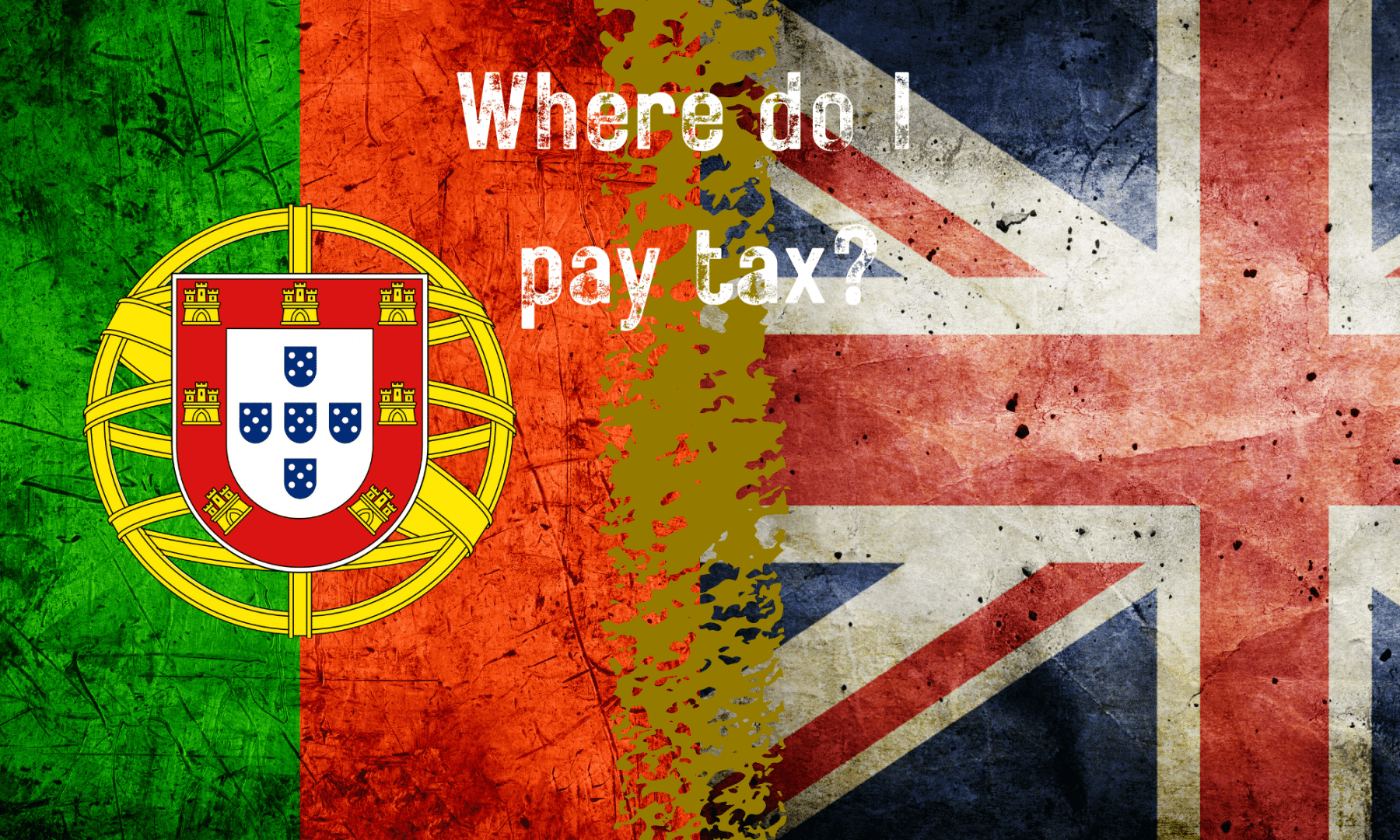
I can pay tax in the UK (or elsewhere)
Portuguese residents must declare and pay tax in Portugal on worldwide income and gains. Individuals commonly think that they can continue to pay taxes in the UK as Portuguese tax residents or choose where to pay taxes on certain assets.
Whilst certain income/gains do remain taxable in the UK i.e. those arising from real estate, this must still be reported in Portugal and any relevant tax due paid. A credit is given for tax paid in the UK, so you will not pay tax twice.
Another common error is pension income. This is taxable in Portugal, not the UK, even if the pension is a UK pension. The only exception to this is government service pensions e.g. teachers, local government, police etc. The UK State Pension is not a government service pension and is therefore taxable in Portugal, not the UK.
I can take my 25% tax free cash from my UK pension
Whilst the UK will record the drawdown as tax-free cash (PCLS) for UK purposes, this is a UK tax break for UK tax residents. Portuguese residents receiving their “tax-free cash” will be taxed on the lump sum as standard pension income in Portugal.
Capital gains tax on properties with AL licenses
The standard rule on property sales for Portuguese tax residents is, 50% of the gain is taxable at scale rates. This is the same if you are selling a property in Portugal or overseas.
If the property you are selling has been your main home in Portugal for at least 2 years, you may be able to qualify for the main residence reliefs and reduce or eliminate the capital gains tax.
If the property has an AL license however, the tax on sale is applied to 95% of the gain, not 50%. Individuals would have to wait 3 years following the cancellation of the AL license to benefit from the standard rates of tax.
Tax efficient structures?
When utilising tax efficient structures it is important to consider the tax consequences. Some structures only tax gains and others do not distinguish between capital and gains.
A common example is a simple platform or bond; here only gains are taxed, however a trust or QNUPS taxes the capital and the gain. So with the latter, you will pay tax even if you have not made a gain or made a loss!
Top financial tips in Spain – March 2024
By Chris Burke
This article is published on: 28th March 2024

Spring is well underway and it won’t be long before the wonderful feeling of summer is upon us – I personally can’t wait!
Part of my role is to make sure you are financially/economically smart and keep you up to date with ways to reduce taxes, increase wealth and anything else I feel an expatriate living in Spain should know. This month we focus on the following topics:
- British Passports – additional months rule!
- Inheritance & Wills – important tax tips
- What were the best investments of 2023
British Passports – additional months rule reminder!
If you are planning to travel to an EU country (except Ireland), or Switzerland, Norway, Iceland, Liechtenstein, Andorra, Monaco, San Marino or Vatican City, you must follow the Schengen area passport requirements.
Your passport must be:
- issued less than 10 years before the date you enter the country (check the ‘date of issue’)
- valid for at least 3 months after the day you plan to leave (check the ‘expiry date’)
Check your passport meets these requirements before you travel. If your passport was issued before 1 October 2018, ´´extra months´´ may have been added to its expiry date.
Surely this is obvious Chris you say? Well, since Brexit I am afraid not. Many people have passports which unknowingly have more than the 10 years validity on them and thus they travel to Spain thinking ‘great, my passport expires in October this year, more than 3 months after I arrive back in the UK from my trip to Spain’. However, the problem is Spain ‘doesn’t accept’ the extra 6 months that were added to the length of this passport.
I mention this because someone on my flight only recently was stopped from leaving the UK due to this. There are no alerts or checks from airlines even with online check-in until you get to the departure gate, a VERY painful way to find out. This applies to Spanish residents also!
Check your passport……. if it has the additional months, make sure you renew it before it’s not valid in Europe. New UK adult passports are now only valid for 10 years.

Inheritance & Wills – important tax tips
One of the FIRST things I tell anyone I meet professionally (whether they ask or not) is that the MOST important person to get on your side in Spain is a good tax adviser/accountant, particularly in respect of inheritance planning, and here is the reason why.
Depending on the relationship to the deceased, the value of the inheritor’s current assets, and the amount they receive, there could be a significant amount of tax to pay in Spain. Just by being organised in many circumstances this can be avoided.
Two case scenarios:
- Someone retired dies who has a partner but they aren’t living together/aren’t officially a couple for administrative purposes or married
- Someone dies and leaves money to grandchildren/nieces/nephews
In these scenarios and depending on where they live in Spain, tax could be payable at a rate of up to 72%……………however, this could be avoided by various methods including using gift tax at 5-9% prior to death or changing some administration before the person passes on from this world.
PLEASE make sure you are organised from an inheritance tax perspective if you think this could have an effect on you. Knowing what the potential tax could be will enable you to make important decisions or plan to avoid this.

What were the best investments of 2023?
Hindsight is a wonderful thing.
However its always important to review and understand what has happened, why, and then decide if you need to change your approach towards most strategies in life, including investing.
Amongst many options, thematic investing has become more and more popular over recent years. To explain this approach simply, you are focusing on a trend/area that you believe will give you higher potential growth on your monies than in a more general investment. For example if you believe that Cyber Security is going to be an area that more people will spend money on in the near future and therefore a good area to invest in, you could target investments that focus solely or predominantly on this specific topic. Because you are being more focused and targeted, this attracts higher risk because your money is invested solely in that area. However, if you are correct then the returns/rewards are generally greater because you have channeled your money into that specific area rather than taking a general approach.
In 2023 it is clear that when you review which investment funds worked well, two key areas stand out more than most (I do not take cryptocurrency into consideration because many investment companies will not consider this, due to still being viewed as an unknown entity, and it being largely unregulated).
Strong performers in 2023 were:
- Technology
- US stock markets
However, it’s important to note that the year before this these were both two of the worst performing…….so how do you know what investment funds to pick, how long to hold them and when to make any changes?
Well, by education……by constantly being informed on a range of factors related to these areas, which could include the following:
- Political
- Environmental
- Laws/legislation
- Economic
Alongside this, considering your investment timelines, your goals and your appetite for risk/reward, then you can start to put together a strategy that with regular reviews and ongoing advice, with someone you trust, will give the best chance of success to achieve your savings and investment goals moving forward.
Click here to read independent reviews on Chris and his advice.
If you would like any more information regarding any of the above, or to talk through your situation initially and receive expert, factual based advice, don’t hesitate to get in touch with me.
Why invest?
By Philip Oxley
This article is published on: 27th March 2024

Why invest in the financial markets when interest rates are so high?
This is the second part of an article about interest rates and their impact on the financial markets for 2024 and beyond. Click here to read the first part of this article.
My article a couple of weeks ago focussed on what has happened over the past couple of years in relation to inflation and interest rates and what is likely to take place next. This article focuses on what all this means for savings and investments. In addition, it will address a key question that was asked of me several times last year – when interest rates are so high and it is possible to obtain a healthy risk-free return, why invest in the roller-coaster that is the financial markets?
Risk & Return
By their very nature, there is always some risk when investing in the financial markets, although it is possible to calibrate a portfolio by the level of risk acceptable to the client. However, over the long term, the risk of your cash diminishing in value is much higher if you leave it in the bank. Certainly, over shorter-term periods the markets can be volatile and at any one point it is possible that the value of your investment will be worth less than the initial value of your premium. This never feels like a good place.
This leads to the question, why take any risk now, when it is possible to benefit from a return of between 3-6% by leaving your money in the bank? Well, in the short term, that’s a reasonable point and especially if your risk profile is low – i.e. you prefer not to take risks with your money, even knowing that this approach is likely to result in a lower return on your funds – then certainly a case can be made for this, at least in the short term.

French Interest-Paying Bank Accounts
In France, the best risk-free returns are to be had utilising the Livret A (maximum deposit of €22,950) and Livret de Développement Durable et Solidaire (LDDS) accounts (maximum deposit of €12,000) which are both paying 3% interest currently, free of tax and social charges. It makes a great deal of sense to place funds in these accounts as they are instant access, and it is important to have funds that you can access easily.
For those on lower incomes, 5% interest can be obtained with a Livret d’Epargne Populaire (LEP), with the maximum amount that can be deposited being €10,000. You will need to provide a copy of last year’s tax return documents (the Avis) to demonstrate that your income level is below the required threshold. Currently this threshold is €22,419 for a one-part and €34,393 for a two-part household – further details in this link https://www.service-public.fr/particuliers/vosdroits/F2367
For those with more significant amounts of funds and/or whose risk profile is higher, these accounts are still well worth using for holding an emergency fund that is easy to access.
For those with bank accounts in the UK, the returns have been even higher, and it has been possible to obtain 5% or even 6% interest, which is certainly appealing.

Risks of Keeping Assets in Cash
However, there is a but – or several buts in fact:
a) If your cash is earning significantly more than 3% (the LEP excepted), the chances are that your funds are in a UK bank account (not French), and you will have to pay tax on this interest in France. Therefore, whatever rate of return you are receiving in the UK, needs to be reduced by nearly one third to arrive at an actual net return.
b) All market commentators believe we are now at peak interest rates – in both the UK and Eurozone – and the next move will be down. Bank rates have been at levels hitherto unseen in decades, but they will surely not remain at this level as we progress through 2024.
c) Benefiting from high interest rates can easily coincide with periods of strong financial market performance – i.e. whilst you are benefitting from one, you could be missing out on the other!
d) Investing in the financial markets has always provided a greater return than cash over the long term.
e) Returns from cash have always failed to keep up with inflation over the long-term.
f) Rathbones, one of the UK’s leading investment managers, has forecasted that equities will return significantly more than cash over the forthcoming decade, see below:
We forecast that equities will return much more than cash over the next decade too
Rahtbones’ 10-year annualised % total return projections in GBP
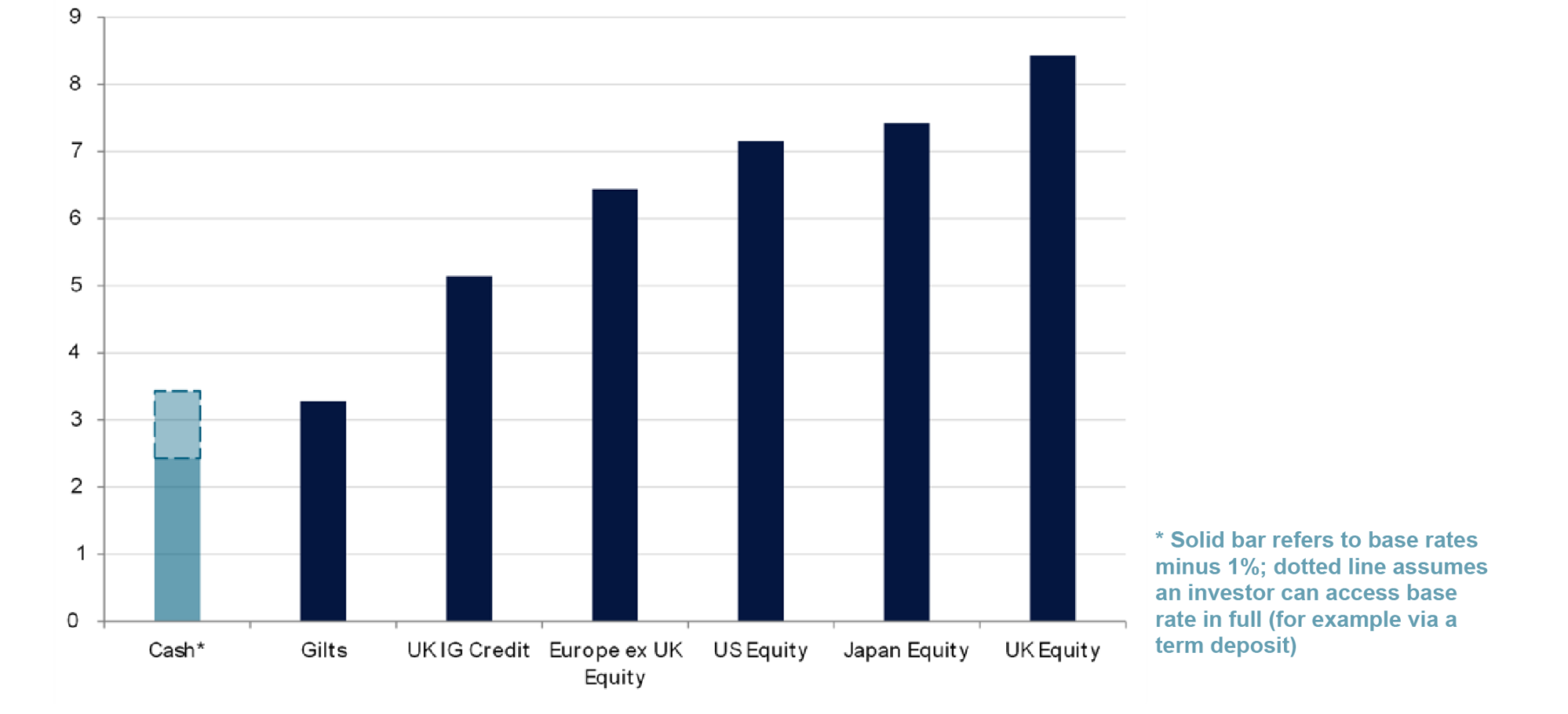
Sources: Refinitiv, Rathbones Our projections were last updated in Q1 2023
Investments can go down as well as up and you could get back less than you invested. Past performance is not a reliable indicator of future results.
One of the best, short articles I have read in relation to the risks of keeping most or all your assets in cash is on Trustnet and quotes from Lindsay James, Investment Strategist at Quilter Investors. I enclose the link to the article below.
Sitting in cash ‘isn’t as risk free as investors think,’ warns Quilter | Trustnet
If you only look at the two graphs, this will illustrate the point clearly:
a) Graph No. 1: The first graph shows what happened to global financial markets in the year following the first interest rate cut (i.e. at the beginning of a rate cutting cycle). There are a few exceptions (most notably during the Global Financial Crisis in 2008/9), but in most cases the financial markets rose strongly. It is too late to wait until this happens and then move funds into the markets, as often the biggest returns can occur over the duration of just a few days, and this leads to the second graph.
b) Graph No. 2: This graph is even more stark, showing the investment returns over a 30-year period of an initial investment of £10,000. Staying invested throughout this period resulted in growth of 1020%. Being absent from the markets for just ten of the best days in the financial markets during this 30-year period, result in a return of half this amount, 469%!
This is why within the world of investing the following saying is so popular – “it’s not about timing the market, but about time in the market” or to put it another way, research has shown that those who remain invested in the markets through the troughs as well as the peaks, generally outperform those who try and time their buy and sell decisions to exit the markets as they fall and buy into the markets as they rise.
The reasons for this are that inevitably, people sell too late (i.e. the markets have already fallen which triggers their decision to exit), and then are too late with their entry back into the markets and miss out on significant gains. Even amongst professionals, it is usually luck not skill (or the benefit of hindsight!) which allows people to call the top or the bottom of the market or get remotely close.
In Summary
Those with limited savings and assets, who cannot afford to lock funds away for several years, should utilise the French interest-paying bank accounts I referred to earlier. Those who are very risk averse and find the prospect of seeing their investments fall in value, stressful and anxiety inducing, should also find the best return they can using risk-free savings accounts, but should also be aware that over the longer term, their savings will inevitably underperform market returns.
However, for everyone else, the evidence clearly demonstrates that investing in the financial markets, irrespective of potential economic or geo-political challenges and even with the current appeal of interest on cash deposits, will, almost without exception, deliver positive long-term financial rewards.
At the risk of oversimplifying – my advice to most people is to set aside sufficient cash for short term needs and unexpected contingencies and invest the rest in a portfolio that is appropriate to your risk profile.
Where should you consider investing any funds? That is for my next article where I will review the best options in France for tax efficient investing.
Where do you go as interest rates fall?
By Portugal team
This article is published on: 27th March 2024

Due to the increase in interest rates over the last couple of years, cash has been a relatively attractive investment however as rates on deposits have started to fall, more investors are again turning to investment portfolios to make their money work harder.
But as the returns fall on cash accounts and short-dated bonds, where can investors turn?
Don’t fall into the reinvestment risk trap
As fixed terms come to an end, many institutions reoffer new terms but with lower rates. After becoming used to decades of very low (or no) interest being offered on savings, it is still easy to find any savings rate above zero attractive – even though we know this is well behind inflation, so the value is going backwards in real terms.
With cash looking less attractive as a long-term option, savvy savers are looking back to the markets to get their money working for the longer term.
But aren’t investments ‘risky’?
Risk is misunderstood and is often confused with volatility. Risk can be more accurately defined as the “chance of permanent loss of capital”, whereas volatility is simply the degree to which investments move up and down.
Although many feel shares in companies are a “risky” investment, if we look back over the past several decades, we can see the chance of permeant loss is very small when investing in high quality “blue-chip” companies such as Apple, Nestle or BP etc.
Volatility is what scares most investors- the ups and the downs. But putting this into perspective, most of us own a home and are aware of what the property market does, it also goes up and down. But unlike with an investment, you don’t have a ticker on your post box telling you the daily price, so you don’t see the volatility and therefore, do not “feel” the risk.

What about returns?
The return you achieve from your portfolio is determined primarily by the composition of the underlying portfolio i.e. the split between shares, bonds and other assets such as property and commodities etc.
Despite the doom and gloom in the world at the moment, markets have done very well over 2023, and whilst cash has offered attractive rates of 5-6%, the S&P500 achieved 24% over 2023.
Longer term returns
Whilst the returns achieved in 2023 are not guaranteed to continue, if we look back at longer term records, figures from Credit Suisse show that over a 123-year period starting in 1900, shares in developed equity markets have generated returns at 5.1% above inflation and emerging equity markets have achieved 3.8% over inflation.
The Credit Suisse figures also show that shares have outperformed cash (and bonds) in every one of the 21 countries their data covered over that 123-year period. This is quite remarkable given this period covers two world wars, two global pandemics, the great depression, dot-com bubble, and the global financial crisis!
So, shares could be considered lower risk than cash or property because of their proven ability to keep pace with inflation over time and therefore protect your money in real terms.

What steps can you take to maximise your annual investment returns?
The return you receive as investor will be determined by a range of factors and there are certain steps you can take to increase your return expectations:
Select the right funds: The difference in fund performance can be startling e.g. in a recent analysis we carried out of the US equity sector, the top performing funds was up 67% whereas the worst was down -25%!
Review regularly: Whilst a buy and hold approach is one of the most popular strategies for investors, reviews are essential. Not only to ensure your risk level, asset mix and diversification are in line with your objectives, but also to ensure your portfolio remains relevant. Looking over a 40-year period at the FTSE 100, only 24 companies (or arguably 35 including mergers and acquisitions) are still in the index since 1984.
Minimise fees: Ensure you have a clear view of what you are paying. Minimising fund management and advisory costs puts more money back into your portfolio and leads to better net performance. Ensure you check and read all paperwork when making any investments, or even better, get a professional second opinion on value.
Minimise tax: With interest, dividends and capital gains tax at 28% for standard residents (note, 28% capital gains tax does still apply to Non-Habitual Residents), tax is one of the biggest eroders of investment return. So, give some thought to how you hold your portfolio and take advantage of the different tax “wrappers” available to Portuguese tax residents, but keep an eye on fees and only seek advice from qualified advisers.
The Value of Seeking Financial Advice
By Peter Brooke
This article is published on: 26th March 2024

My name is Peter, and I am a financial adviser!
There, I have said it, and I can own it!
The personal financial advice industry has often been regarded as a home for insurance salesmen in shiny suits or as an out-of-reach luxury for the very wealthy. It hasn’t helped with various mis-selling scandals over the years and high levels of hidden fees, but after 25 years in this industry I wanted to make the case as to why we are not all the same and show what true value can be taken from seeking professional advice.
Fortunately, our industry has changed a lot over those 25 years and transparency, communication and ‘putting the client first’ have now become the values most of us live and work by.
As a little background, I wanted to be a Vet or a Doctor when I was at school, I loved science and maths but didn’t truly focus enough on my A-Levels and was found wanting when it came to getting into Medical School. I ended up studying Molecular Genetics at Sussex University but discovered that I also didn’t want a life in a lab. As a ‘frustrated Doctor’ I ended up in Pharmaceutical Sales… great fun as a young man straight out of Uni but it became a very demoralising job and one which I discovered was really all about making money, not helping people.

I was encouraged by a family friend to look at stockbroking or financial planning as a change of track and started work in 1999 (dot com!!) at an investment advisory business in London. We introduced the UK’s first ‘advisory-discount’ services where we would provide personalised investment recommendations at discounted fees.
Ironically, it took moving to an industry that concentrates solely on money to realise that I could actually help people achieve wellbeing and peace of mind through my abilities to discuss and explain complex issues.
In 2004 I moved to France and started working with The Spectrum IFA Group, helping English speaking expatriates to create and realise their plans for living in France, I have been here ever since. I especially wanted to join a fully regulated company which gave me the independence of my own business and together we have grown to where we are today – 50 advisers operating across Europe, in France, Spain, Portugal, Italy, Luxembourg, Malta and Switzerland.

What should we, as financial advisers, aim to provide to our clients?
I believe our true value lies in helping our clients answer two main questions:
1. Am I going to be ok, financially, and if not, what do I need to do to make sure I am?
2. What have you, as my adviser, done for me?
The first question is the core of a good adviser’s skill set and business strategy – it is all about helping identify and plan for different stages of life. Correctly laying out a ‘roadmap’ for the future and asking the difficult questions; this can truly provide the peace of mind that you, as my client, are on target, and if not what do we need to change or compromise on to ensure you get there.
This roadmap then needs ongoing reviews, especially as life throws various obstacles at us along the way.
The second question is the ‘HOW’ of the first question. Historically we have valued good advice, and what we pay for it, as a percentage measurement of investment performance, which the adviser actually has minimal control over.
I believe it is more nuanced than this and can be broken down to six key areas in which we can (and should) add value and help answer that first very important question:

We help to bring order to your financial life by assisting setting budgets and cash flow targets as well as overseeing and reviewing investments, insurance, estate plans, taxes, etc.

We are a sounding board to help you follow through on your financial commitments, by identifying and prioritising goals, and then explaining, in plain english, the steps to take, and then regularly reviewing your progress towards them.

We offer insight from the outside to help you avoid emotionally driven decisions in important money matters; we are available to consult with you at key moments of decision-making, providing the necessary research to ensure you have all the information to make the best choices.

We help you anticipate life events and changes and be financially and emotionally prepared for them. We can help in creating, ahead of time, the action plan necessary to address and manage any life transitions that inevitably appear.

We explore what specific knowledge will be needed to succeed in your plans by understanding your situation and then providing the necessary resources to facilitate your decisions, and explaining the options and risks associated with each choice in a clear and simple manner.

We aim to help you achieve the best life possible but will work with you, not just for you, to make this possible. We will take the time to clearly understand your background, philosophy, needs and aspirations and will work collaboratively with you and on your behalf (with your permission, of course).
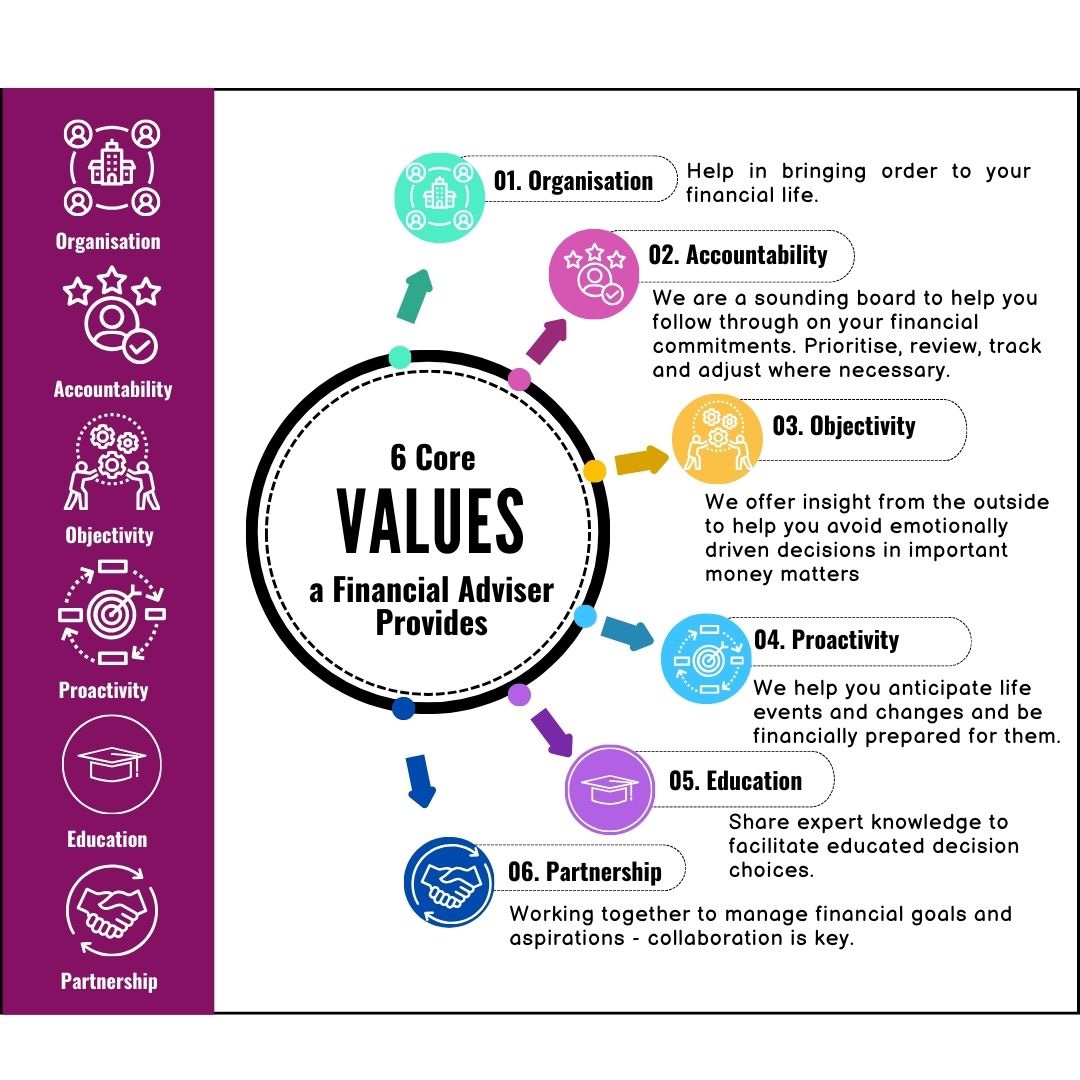
Upfront about what it costs
For me, helping people is at the centre of my personal values – being paid to do this is a welcome bonus and I have long believed that our jobs find us, not the other way round. I have always been a bit of a ‘planner’ and see ‘the big picture’ in most situations – helping people see that ‘they are going to be ok’, or explaining ‘what they need to do to get there’ is a truly pleasurable challenge for me.
Price is what you pay, Value’s what you get
I firmly believe my clients get value for money. In Europe we are not regulated to handle client money so will never send you a bill for you to pay us directly.
Spectrum is remunerated by the insurance or investment company which provide the final financial solution to you and with whom you have a direct relationship, with us ‘appointed’ as your adviser.
I believe in transparency of all costs and charges so you know exactly what you are paying and to whom. Our charges are competitive, we only use clean share classes of funds so there are no hidden or double fees.

Making the time – ‘How can I help?’
I live and work in a community of English speaking expatiates where referrals and recommendations count for a great deal. I always feel very proud and grateful when an existing client refers me to another family member or friend who might be able to benefit from the services that I offer. So thank you for trusting me with them and I look forward to helping more in the future.
Snapshot of our services
- Financial Planning & Budgeting
- Family protection
- Cash Flow Planning
- Investment Management Advice/Guidance
- Tax optimisation through tax efficient products
- Estate & Inheritance planning
- Risk Management, diversification & asset allocation
- Retirement planning
- Education cost planning
- Long term care planning
- Pension advice including transfer and consolidation
If you know someone who might need our services, feel free to get in touch and forward them this email – the link above can be used to book a 30 minute call with me directly. If I can’t help then I may be able to direct them to someone who can.
If you have any questions or would like a catch up then please use any of the below communication channels or the booking system – always drop me a quick message if you need a time slot outside of those available.
For existing clients the CashCalc secure portal is a great place to update any information, send me documents or even a direct secure message.
If you have missed any previous emails, click here to access the Archive.
Exciting times ahead
By Jeremy Ferguson
This article is published on: 26th March 2024

For those of you who are retirees, you will have lived through an incredible age of change and prosperity. You will remember the days of stopping the car and going to a phone box to make a call, possibly dictating a letter for a colleague to type for you, waiting for the post each morning to see if your recent job interview had been successful. Cars with no seat belts, and only the well-off flying around the world for holidays etc. On and on I could go, but you get my point, I hope.
Most of us would have started to write emails in the mid 90’s, and since then the advances in the use of the internet have increased exponentially. Mobile phones now are quite simply the most amazing multi-media tools, with what seems like the whole world obsessed with them. Maybe they aren’t a good thing for society, only time will tell.
But what I do know is the fact that you can use them to navigate anywhere, watch TV, read the newspaper, write emails, pay for your car parking online, translate between languages etc. All of this just never ceases to amaze me. Could you imagine telling someone a decade ago, this is where we would end up with mobile phones? Overall, this technology at our fingertips is incredibly useful and has changed the way we live.
The next decade is going to see an ever-increasing transformation in the use of technology, not only in our daily lives, but also in business and commerce. I am sure you have all heard of the Artificial Intelligence (AI) race that is underway at the moment.

AI technology has recently been on trial in a Scottish hospital, analysing mammogram data, and managed to spot cancer in a number of patients which had been missed (due to its tiny nature) by the consultants. This is a perfect example of how this technology can be used to improve our lives.
There are four main areas of ongoing technological advance that may be worth observing over the coming years. Companies operating in these sectors offer huge growth potential for their shareholders.
There are AI companies, such as Microsoft, Amazon and Canon; and those specialising in financial technology (Fintech), Sage being prominent in this market, as well as Ricoh; there are robotics specialists, IBM and Adobe for example; and finally, the one we are all bored of hearing about, energy storage – many of the companies in this market are new, so there are few familiar names in there, but SAP is one name some of us may recognise.
The advances we are seeing in these areas are quite incredible, and if you think about it, the technology itself helps to further increase the speed of the new developments. Businesses who embrace these technologies to maximise their efficiency will all benefit from these advances. The knock-on effect will be far reaching and ever present in everyday life.

My clients are retirees here on the Costa Del Sol, now living off pensions and investments they have accrued over the years, and one of my responsibilities is making sure they are getting the most from those investments. With the world changing so quickly, it is essential we pay attention to the management of those funds, in particular to ensure that whoever is making the investment decisions is forward looking in their approach, and importantly understands the new world evolving around us.
Please feel free to email me if you would like to discuss your existing investments and pension funds, to see whether we can help make them work as hard for you in retirement as you did in your working life to accrue them.
Portugal´s tax incentives in 2024
By Portugal team
This article is published on: 25th March 2024

With the ending of the 10 year tax incentivised Non-Habitual Residence scheme (NHR) as at 31st December 2023, many are now reassessing their plans to move to Portugal and existing residents are also asking how the changes affect their plans.
Existing NHRs unaffected
Individuals with NHR status will not be affected and will continue to enjoy the benefits under the scheme until the 10-year period ends. But these individuals should taking advantage of the unique opportunity and tax plan for the future, even if Portugal is not a permanent move there are opportunities to wash out capital gains or draw lump sums at potentially lower rates than other countries.
Transitional NHR rules
NHR is still open to individuals who qualify under the transitional rules and applications are open until the end of 2024. The criteria are:
1. On 31st December you meet the conditions to qualify as a Portuguese tax resident, or
2. You become Portuguese resident by 31st December 2024 and have either:
- work contract or agreement dated prior to 31st December 2023, the duties under which are carried out in Portugal
- property lease signed prior to 10th October 2023
- promissory contract for Portuguese property signed before 10th October 2023
- enrollment of a dependant in education in Portugal by to 10th October 2023
- residence visa or permit valid up until 31st December 2023
- initiation of the process for visa or residence before 31st December 2023
If you are eligible but are not sure whether to push forward with the application, the benefits are very attractive. The main benefits being:
- 0% tax on certain types of foreign source income and capital gains
- 10% tax on foreign pension income
- Lower rates of employment and self employment tax on “high value activities”
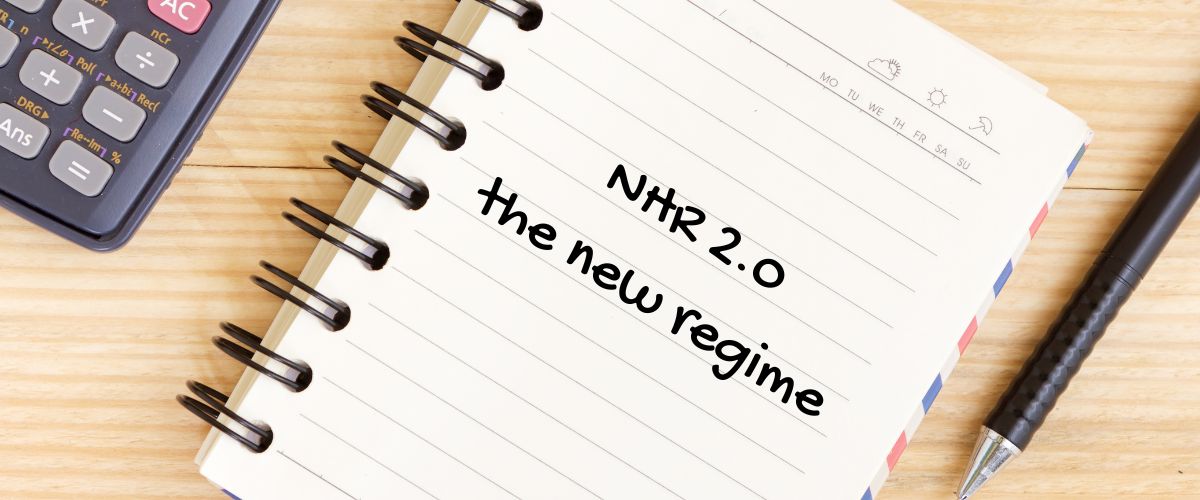
NHR 2.0 – the new regime
Although qualifying for the new tax regime is more difficult than the old NHR, the major benefit is that for 10 years there is 0% tax on all foreign source income and gains. The only exceptions to this are income from backlisted jurisdictions or pension income.
The new regime is open from 1st January 2024 and the main qualifying criteria are:
- Not tax resident in Portugal in the previous 5 years
- Must become a tax resident in Portugal
- Not have benefited from the NHR regime
- Exercising a qualifying role/activity in Portugal. These are aimed primarily, but not exclusively, in the fields of scientific research and higher education
Expats & the standard regime
If you cannot qualify for either of the two tax schemes, Portugal can still be a financially attractive place to live – there is no wealth tax, inheritance tax or tax on transfer of capital into or out of the country.
Standard rates of income and capital gains tax can be comparable or better than the UK, depending on each person’s situation. It is also possible to establish investment and pension structures as a Portuguese tax resident to benefit from lower rates of tax.
Irrespective of which position you are in, planning is required to put yourself in the best position and it is never too late to start planning. Speak to several suitably qualified professionals, compare fees, and do not be afraid to get a second opinion or a sense check.
Buying you dream home in France
By Amanda Johnson
This article is published on: 20th March 2024

LIVE WEBINAR
TUESDAY 26TH MARCH
7pm – 8pm
We have a highly experienced team of panelists who will discuss all things to do with buying in and relocating to France.
I have worked with many of the panelists for a number of years and their knowledge and experience is valuable to me and my clients; so if you are looking at buying and/or relocating to France then please join us for this live webinar
Our experienced panelists are here to discuss all nature of topics to do with buying and relocating to France:
Karen Tait – Webinar host
Amanda Johnson – Wealth & tax expert from The Spectrum IF Group
Joanna Leggett – French Property Expert from Leggett
Jonathan Watson – Currency Expert from Lumon
Paulette Booth – Banking and insurance expert from AXA
Tracy Leonetti – Visa & paperwork expert from LBS
Sharon Revol – Mortgage expert from Cafpi



